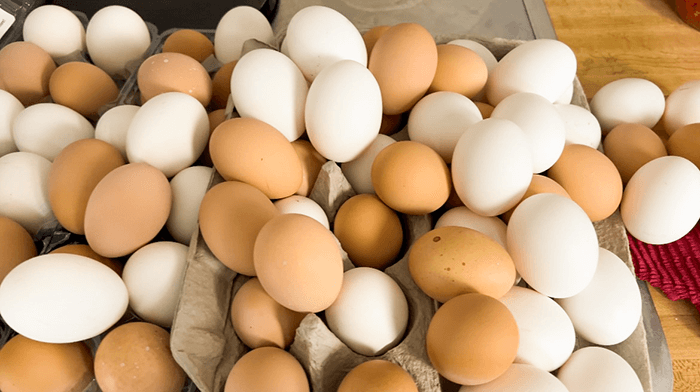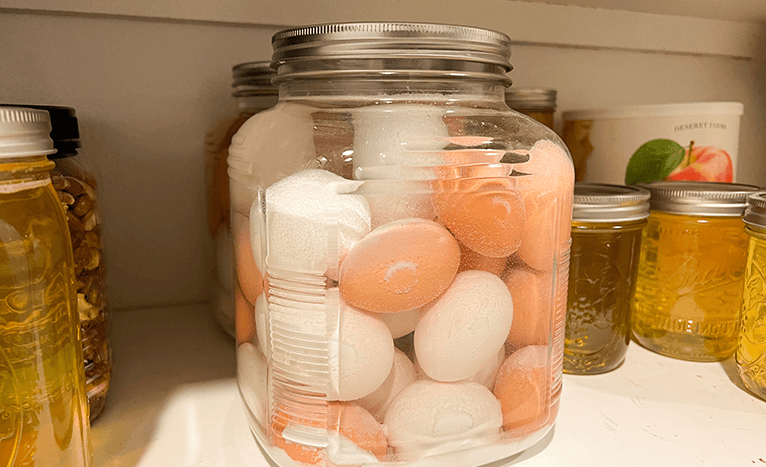What do you do when you have an abundance of farm fresh eggs?
The easiest way to preserve eggs for a long duration is to water glass your eggs! My 13 hens have been working overtime this summer to provide me with a surplus of eggs, and I don’t let them go to waste! I give them away to friends and neighbors and share with my dogs. Even after all of the sharing, I’m still left with so many eggs! When you get around a dozen eggs a day, you can imagine how fast my kitchen counter fills up with them! Water glassing is easy, budget-friendly, and efficient.
What is water glassing eggs?
It is a method of preserving eggs for a long period of time (up to two years!) The process involves creating a pickle lime solution to pour over a jar full of eggs. The high calcium content in the pickle lime solution clogs the pours in the egg shells and kills any microbes in the jar and prevents bacteria from thriving. The eggs will be as good as the day you put them into the solution!
Are water glassing eggs safe?
Yes, this method of egg preservation has been used for hundreds of years. The water glassed eggs are safe for human consumption and as good as the day you put them in. Granted, eggs can spoil if there are any cracks or the solution wasn’t properly prepared.
Make sure to use gloves to remove the eggs from the solution because the pickling lime solution can be irritating to the skin. Also, wash the eggs to make sure none of the solution ends up in the dish you are using the eggs for.
What eggs can be used for water glassing?
Only farm fresh eggs can be used for water glassing. Farm fresh eggs still have the bloom intact on the shell. The bloom is a protective barrier that is destroyed when store-bought eggs are washed and bleached at the mass production plants. Because you need the bloom for water glassing, you can never use store bought eggs for water glassing. Also, do not wash your eggs before water glassing.
You will want to use clean eggs from your coop—no poop, dirt, or debris covering the eggs which I show in my water glassing eggs video.
Can you water glass duck and quail eggs?
Yes! Just like chicken eggs, you can preserve duck and quail eggs. Same rules apply: clean, debris free, unwashed eggs are needed to water glass correctly.
What is egg bloom?
The bloom covering the egg is the natural protective layer. Egg shells are naturally porous and the bloom keeps bacteria and air from entering into the egg. This bloom is destroyed when you wash the eggs.
The bloom is sealed in place by the pickling lime solution, so your eggs become airtight!
What do you need to water glass eggs?
All you need is: farm fresh eggs, a bucket or jar to store the eggs in, pickling lime, and water! In my experience, 2 quarts of pickling solution covers about 2 dozen (24 eggs.)

What is pickling lime?
Pickling lime is calcium hydroxide. If you don’t have brand pickling lime, you can also use calcium hydroxide that may be chilling in your medicine cabinet (I have some in mine.) Pickling lime is found in stores in the canning aisles with the other canning supplies. Sodium Silicate can also be used to water glass eggs.
When is the best time to water glass your eggs?
Any time! The most common time to water glass eggs is when your chickens are producing an abundance of eggs in the summer. Water glassing allows you to have fresh eggs throughout the winter and not have to worry about buying any from the store.
How do you water glass eggs?
You will need these ingredients and items:
Pickling lime, airtight containers, a tablespoon, eggs, and distilled water (free from chlorine and fluoride.)

Water Glassing Eggs
Ingredients
- 1 dozen unwashed, farm fresh eggs
- 1 quart distilled water
- 1 tablespoon pickling lime
- Container or jar
Instructions
- Carefully fill the container with the unwashed, farm fresh eggs. Stack the eggs and make sure that none of them break.
- Create the pickle lime solution by combining 1 quart of distilled water and 1 tablespoon of pickling lime.
- Cover the eggs with the pickling lime solution. Depending on the shape of your container, the solution may not fully cover the eggs. Make as much solution as you need to ensure that the eggs are fully covered.
- Store in a dark place and be careful when moving so the eggs don’t crack. Date and label the container so you know when you stored them!
- Store up to 2 years! Wash the eggs before cracking them to use.
